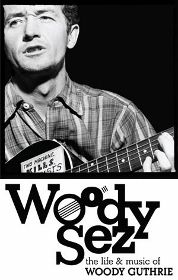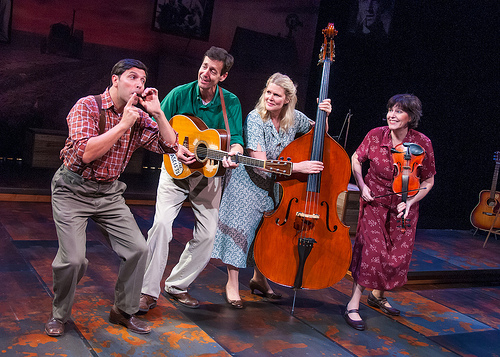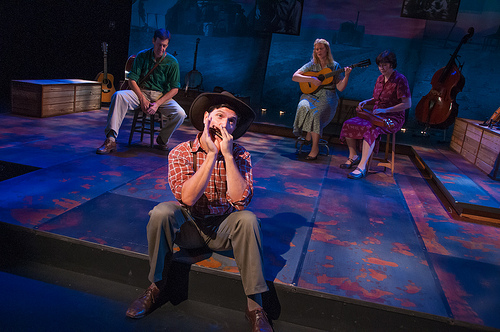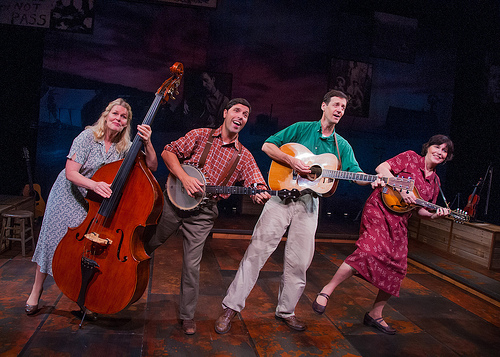INTO THE WOODY
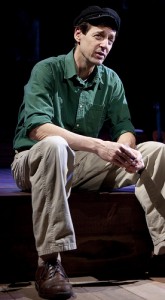 American folksinger/composer/political activist Woody Guthrie lived during the Great Depression of the 1930’s and the turbulent wartime and postwar years of the 1940’s. In his music Guthrie became the voice of the common man and woman and child in America, especially the oppressed, the exploited, and the dispossessed. Woody Sez celebrates the man, and a wonderful tribute it is.
American folksinger/composer/political activist Woody Guthrie lived during the Great Depression of the 1930’s and the turbulent wartime and postwar years of the 1940’s. In his music Guthrie became the voice of the common man and woman and child in America, especially the oppressed, the exploited, and the dispossessed. Woody Sez celebrates the man, and a wonderful tribute it is.
Oddly enough, the musical at Northlight originated in Scotland at the 2007 Fringe Festival. It’s performed by an exceptional quartet of singers and musicians, three of whom were part of the 2007 production. The four combine to play a whole orchestra of folk music instruments with a versatility and virtuosity that could go unappreciated because they perform with absolutely no affectation. The show runs about 100 minutes without intermission and the songs and biographical inserts flow with a low-key but high-spirited naturalism that effortlessly draws the audience into Woody’s world and spirit.
Guthrie saw himself as the voice for people who had no voice, especially the farmers victimized by the Great Depression of the 1930’s in the Midwest and Southwest. Woody attacked the American Establishment’”the bankers, the government, the corporations, and the thugs they employed. His weapons were his songs, some satirical, some angry. Guthrie wrote hundreds of songs and adapted many more. His signature song is “This Land Is Your Land,” maybe the most patriotic anthem in American music, along with the familiar “So Long It’s Been Good to Know Yuh” and “This Train Is Bound for Glory.”
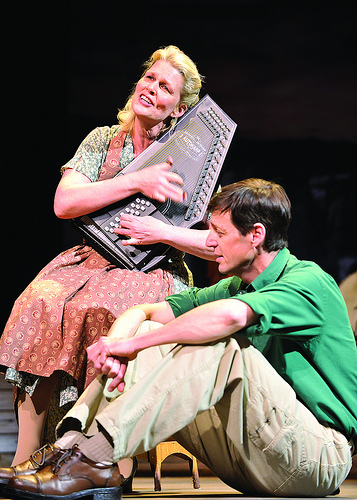 But the less familiar songs will be revelations to most viewers. Guthrie wrote about the devastating effects of poverty in the poignant and bitter “I Ain’t Got No Home.” The spritely “Jolly Banker” attacks the capitalists who smoothly and callously rip off the unprotected common people. Whatever the audience’s attitude towards labor unions today, they have got to be stirred by the rousing “Union Maid.” The horrors of a dust storm in Oklahoma in 1935 are portrayed in the vivid and dramatic “Dust Bowl Disaster.”
But the less familiar songs will be revelations to most viewers. Guthrie wrote about the devastating effects of poverty in the poignant and bitter “I Ain’t Got No Home.” The spritely “Jolly Banker” attacks the capitalists who smoothly and callously rip off the unprotected common people. Whatever the audience’s attitude towards labor unions today, they have got to be stirred by the rousing “Union Maid.” The horrors of a dust storm in Oklahoma in 1935 are portrayed in the vivid and dramatic “Dust Bowl Disaster.”
The four performers look and sound as authentic as Guthrie’s music. Darcie Deaville and Helen Jean Russell wear the shapeless dresses of the Depression years. David Lutken and David Finch wear the work shirts and plain trousers of the common man (costume design by Jeffrey Meek). The foursome all move between the words and music with an ease and a spontaneity that reflects long hours of rehearsal, and the deft and invisible directorial hand of Nick Corley. Of course, the performers have been doing this show for years and they are obviously comfortable with the material, and their respect and affection for Guthrie resonates throughout the evening.
Guthrie’s life was filled with personal tragedy, with the loss of a sibling and a child in house fires and a mother who eventually died in an insane asylum. Woody contracted a hereditary nerve disease that left him virtually helpless his final years until his death at the age of 55 in 1967. But all the personal misfortunes never dulled his fighting spirit. He was always a man of the people, and at a time when left wing social protest could mean jail or physical danger. He wasn’t a dilettante dabbling in sympathy for the downtrodden. In his writings and his music he put himself on the front lines. He was a stubborn man and maybe not always easy to get along with, but he never wavered in his support for the common people and his hostility toward the forces that humiliated them, brutalized them, and denied them their rights.
The Northlight production takes place within a roughhewn wooden set designed by Luke Hegel-Cantarella that reflects the hard scrabble backdrop of the words and music. The sound design by Rick Sims and the lighting by Chris Binder are unobtrusive. The performers speak directly to the audience, with Lutken with his Texas drawl taking on the persona of Guthrie. Lutken happily avoids the temptations of folksiness. There is no faux homespun quality to pander to the spectator’s emotions, though by the final moments of the show the viewer is entitled to get a little misty-eyed.
Woody Sez is not a high concept show, which may be its greatest virtue. The staging is a straightforward portrait of a great American created by four terrific entertainers who believe in their subject with a conviction that carries the audience along with them.
photos courtesy of Northlight Theatre
Woody Sez
Northlight Theatre
9501 Skokie Blvd in Skokie
ends on October 21, 2012
for tickets, call 847.673.6300 or visit Northlight Theatre
for more shows, visit Theatre in Chicago
